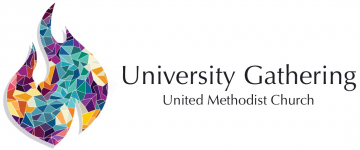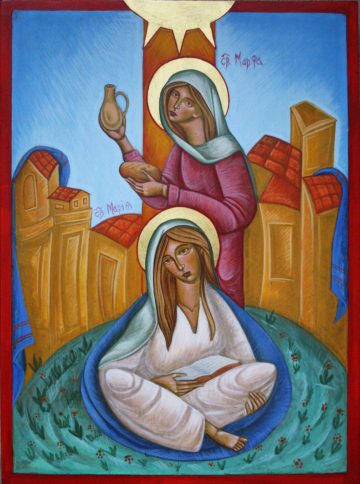Beyond Sameness: Becoming a Community of Difference
“Saints Mary and Martha” by Ukrainian iconographer, Nadia Solomija
Kindred in Christ,
This Sunday, we continue our Interwoven by Grace series with a message titled “Beyond Sameness: Becoming a Community of Difference.”
The story of Mary and Martha in Luke 10 has often been misused—to pit spiritual contemplation against practical service, and worse, to dismiss the work of women, caregivers, and laborers as somehow less important than study, scholarship, or prayer. But when we slow down and really listen to the text, something much richer emerges.
You may know the story: Jesus comes to their home. Martha jumps into action—preparing the meal, caring for her guest, doing what needed to be done. Mary sits at Jesus’ feet, listening and learning. When Martha asks Jesus to make Mary help her, Jesus gently responds, “Martha, Martha, you are worried and distracted by many things… Mary has chosen the better part.”
Over time, some have interpreted this as Jesus choosing one sister over the other. But many feminist and womanist theologians have helped us hear it more faithfully. Jesus doesn’t rebuke Martha for working—he simply names her unnecessary worry and distraction. And Mary’s desire to learn from Jesus? That was a courageous choice in a world where theological conversation was often off-limits to women. Jesus affirms her full dignity as a disciple.
Interestingly, in traditional Christian iconography, we see a deeper understanding of this story. Mary is often depicted in a posture of contemplation or adoration. And Martha? She’s holding a loaf of bread or a chalice—symbols of service, hospitality, and Communion. Together, they reflect what the early Church knew: both women’s actions were holy. Listening and labor. Contemplation and action.
Rather than telling us to choose one over the other, this story invites us to hold the tension—and to honor the many ways people show up in faith. As our two congregations walk together in this season of discernment, this story offers us a timely reminder: being a community of grace doesn’t mean we all serve in the same way. It means we create space for difference and learn to trust each other’s gifts.
Whether you find yourself more like Martha or Mary—or maybe a bit of both—I hope you’ll join us this Sunday as we explore what it means to be a community of difference, woven together by love.
There’s a place for you at the table.
Alongside you,
Rev. Paul Ortiz

